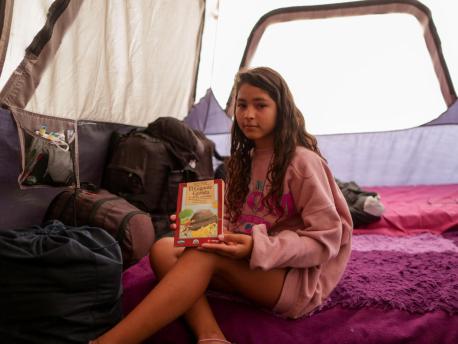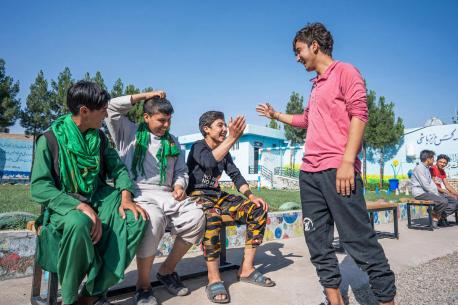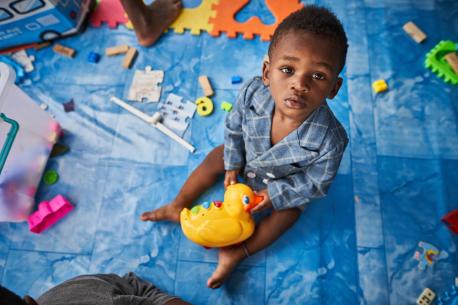
Children Are Children First, Regardless of Immigration Status
Children forced from their homes by poverty and violence have the right to be protected and supported at every step along the way.
Since early May, more than 2,000 children — many of them babies and toddlers — have been separated from their parents after crossing the southern U.S. border. As the government continues to grapple with policy changes, it is unclear when or if those children will be reunited with their families. Whether they are alone or with a parent, the inhumane detention of migrant children in the U.S. remains a growing human rights issue: a total of 11,786 children under age 18 are currently detained, according to the Department of Health and Human Services' Office of Refugee Settlement.
"I am looking at what is happening to children at our borders and I am left feeling that this treatment is cruel and unacceptable," says UNICEF USA President and CEO Caryl M. Stern. "We are failing children and we are failing our moral duty as a nation. As a non-partisan organization, we know we must not allow the politics of adults to victimize children. We must stop seeing these children as just 'refugees' or 'migrants' and instead see them for what they are: children first... after all, a child is a child."
We are failing our children and we are failing our moral duty as a nation. — UNICEF USA President and CEO Caryl M. Stern
Around the world, 50 million children are on the move, crossing dangerous borders and struggling to survive. Migrant children and families from Latin American and the Caribbean, mainly from El Salvador, Guatemala, Honduras and Mexico, face life-threatening situations and multiple forms of violence. They seek to get away from violent gangs that target them or poverty and exclusion that deprive them of opportunities and hope.
Detention and family separation are traumatic experiences that can leave children more vulnerable to exploitation and abuse and can create toxic stress that impacts children's longterm development
UNICEF has highlighted and advocated tirelessly for children's rights around the globe for more than 70 years, and knows that children on the move need to be protected and supported at every step along the way — in their home countries, in transit and across borders. Detention and family separation are traumatic experiences that can leave children more vulnerable to exploitation and abuse and can create toxic stress which, as multiple studies have shown, can impact children's longterm development.
Separating children from their families at the border is unacceptable & UNICEF USA condemns it in the strongest possible terms.
— UNICEF USA (@UNICEFUSA) June 20, 2018
We must stop seeing children as just “refugees” or “migrants” and instead see them for what they are: #ChildrenFirst — UNICEF USA's @CarylSternpic.twitter.com/lhUzr0x4FT
"Stories of children, some of them just babies, being separated from their parents as they seek safety in the U.S. are heartbreaking," says UNICEF Executive Director Henrietta Fore. "Children — no matter where they come from or what their migration status — are children first and foremost. Those who were left with no option but to flee their homes have the right to be protected, access essential services and be with their families — just like all children. It is the realization of these rights that gives every child the best chance at a healthy, happy and productive future."
Those left with no option but to flee their homes have the right to be protected, access essential services and be with their families — just like all children. — UNICEF Executive Director Henrietta Fore
The practices and conditions that children are currently facing are violating their fundamental human rights. UNICEF USA is calling for immediate and open access to all facilities housing children, to ensure they get the care and essential services they need to stay safe and healthy. Psychosocial support will be essential, to help them heal from the trauma they've experienced — through no fault of their own — while fleeing violence and devastating poverty at home. UNICEF USA is calling for transparent and child-centered supports for these children now and into the future.
UNICEF USA is calling for immediate and open access to all facilities housing children, to ensure they get the care and essential services they need to stay safe and healthy
The U.S. has been a leader in the humanitarian space, with longstanding moral and historic responsibility to help all children in need. UNICEF USA is calling on our elected leaders to immediately end the practice of detaining children, to reunite parents with their children, to provide the necessary support and services and to ensure that children at our borders will be kept safe and protected in the future.
"For decades, the U.S. government and its people have supported our efforts to help child refugees, asylum seekers and migrants affected by crises across the globe," says Fore. "Whether it be war in Syria or South Sudan, famine in Somalia or an earthquake in Haiti, the U.S. has been there to help, and take in, uprooted children.
"I hope that the best interests of refugee and migrant children will be paramount in the application of U.S. asylum procedures and laws."
Learn more about how UNICEF is mobilizing to protect and support migrant children in the U.S.
Top photo: This 8-year-old's older brother lost his leg when he fell off a freight train en route to the U.S., where he had hoped to get a job so he could send money home to his mother and five siblings, who live in extreme poverty in Omoa, Honduras. © UNICEF/UN028143/Zehbrauskas
HOW TO HELP
There are many ways to make a difference
War, famine, poverty, natural disasters — threats to the world's children keep coming. But UNICEF won't stop working to keep children healthy and safe.
UNICEF works in over 190 countries and territories — more places than any other children's organization. UNICEF has the world's largest humanitarian warehouse and, when disaster strikes, can get supplies almost anywhere within 72 hours. Constantly innovating, always advocating for a better world for children, UNICEF works to ensure that every child can grow up healthy, educated, protected and respected.
Would you like to help give all children the opportunity to reach their full potential? There are many ways to get involved.





